|
Last week I offered some tips to support parents in talking to their girls about puberty and getting their first period, because now more than ever, parents need to have the knowledge and confidence to be able to discuss sexuality with their children. The work of parents also needs to be backed up by quality holistic sexuality education within all our schools.
If, like many parents, you assume that your child is already getting basic sexuality education at school, think again. Despite the fact that more than half of Australian teenagers are sexually active by the time they are 16, there is no mandatory, comprehensive Australia-wide sex-education policy. In New Zealand, sexuality education is a key area of learning in the National Curriculum, which means that it must be taught at primary- and secondary-school levels. Yet a 2007 report by the New Zealand Education Review Office concluded: “The majority of school sexuality education programmes are not meeting students’ learning needs.” In both countries, there are some schools that offer fantastic programs, but there is no guarantee that your child will be one of the lucky ones. Many parents say to me, “Oh, but my child has no interest/no idea/no awareness about anything to do with sexuality.” This may be true, but their classmates do, and their classmates are talking. If a child isn’t getting information from her family or her school, she will turn to her friends or the internet. I don’t have to persuade you that googling “vagina” is probably not going to throw up much useful advice for a 10-year-old. So I urge schools to do everything they can to meet the physical and emotional needs of students as they reach puberty. Make it age appropriate. As I discussed in an earlier post, puberty is starting earlier for girls, and it is important that they understand what is happening to them before they get their first period. This means that schools need to rethink the age at which they teach students about puberty. In New Zealand for at least the past 40 years, students have been taught about puberty usually in years 7 and 8. As it is not uncommon for girls to start menstruating at age 9 or 10 now, I encourage schools to teach it in years 5 and 6. Don’t segregate! Ensure that the boys in your school are equally well informed about female puberty as the girls, and vice versa. The boys need to be in on the period talks, and the girls need to understand erections and breaking voices. If girls and boys understand what the other is experiencing and why the changes happen, bullying is likely to be greatly reduced. When we had the puberty talk at school, the boys and the girls were separated. I never knew what the boys learnt, but afterwards they were fascinated with our ‘pad packs’ that we’d been given, and they stole them and teased us, demanding to know what we had been told. We were all really embarrassed and didn’t know what to say to the boys. I thought that it would be really naughty if we told them – because obviously our teacher didn’t want them knowing. Because they weren’t taught about it, it made it seem like periods were taboo and secret from boys. — Kelly School was tough. The boys used to grope us to see if we were wearing a pad, then announce to the entire corridor that we had our periods. Or they’d go into your locker looking for pads to steal and stick all over the corridor. — Sophie Stock your library with books and pamphlets on puberty. Age-appropriate books and take-away pamphlets are fantastic for students to access in their own time and when they need answers. Primary schools can be reluctant to put sexuality and puberty books in the library for fear that parents of younger students will complain. One solution that I have seen in some schools is to have a special part of the library dedicated to the older students. These students like it because it’s their special place, and it’s somewhere they can go for answers if they don’t feel comfortable asking their teachers or parents. Make sure students know where to go for help and advice. Students need to know who to go to for support at school if they have concerns or questions about puberty or sexuality. Make sure that girls also know where a supply of pads are kept in case they are caught out. Many schools have these at the administration office, which is always staffed during the day. It is worth having a brief discussion with staff at the start of the year about what to do when a girl gets her period and needs support, as some staff will be unaware of the stress that periods cause some girls. I got my period for the first time in my first week of high school. I was mortified because I didn’t have a pad. My friend went and asked the lady at the front desk and she gave me one – thank goodness! I am not sure what I would have done otherwise. — Laura There was always the fear of getting caught at the far end of school from my locker, needing to change pads and having, in the time a teacher thought was acceptable for a loo stop, to run from one end of the school to another to get supplies. — Sophie Also be sure that girls can dispose of used pads and tampons appropriately. As the average age at which girls get their first period decreases, primary schools now need to make sure there are sanitary bins in the girls’ toilets. I urge parents to encourage their daughter's school to offer quality holistic sexuality education and to check what measures the school is taking to ensure girls are supported through puberty.
2 Comments
When I mention the ‘P’ word to a group of tweens, it usually incites squeals of embarrassment and excitement. Girls crave information about what will happen to their body over the next few years but are often not quite sure how, who or where to ask.
It can be a difficult time for parents. They may feel excitement at their girl reaching the next stage in life. But there is sometimes also a sense of sadness that their little girl is growing up or anxiety about how their girl will cope, particularly if she is young. Many parents are embarrassed or reluctant to discuss puberty with their children and often feel that they don’t know enough to teach them – if you feel this way, you are not alone! The most important thing you can do with the girls in your life is talk, talk, talk! Rather than having a single “puberty talk”, it needs to be an ongoing conversation. Seize upon teachable moments to discuss puberty and related issues with your daughter. The more we talk, the easier it gets, and girls start to see periods as a normal part of the female experience. I’ve found it distressing helping girls who have come to me in absolute shock because their period had started and they didn’t know what to do, because no one had ever talked to them about it. I got my period when I was 11 and I had no idea what was happening. My mother just said it was horrible and dirty and refused to discuss it. My Dad explained in horribly embarrassed terms. It was really traumatic. – Emma My mum and I were sitting in the doctor’s waiting room and there was a poster on the wall with a picture of a toilet and the words ‘If you see blood in here, talk to your doctor.’ Obviously my mother saw it and thought it would be a good time to give me the period talk – without actually using the words period, menstruation, monthly, tampons or pads. She simply said, ‘If you see blood in your undies, let me know.’ For years I thought she was talking about bowel cancer. – Kim Powell If you are a reluctant puberty talker, there are some great resources that can help you become more comfortable, including these books, Menstruation.com.au and Puberty Girl author Shushann Movsessian’s website. Also look for parent workshops in your area. In many cultures, a girl’s first period is a rite of passage that is revered and celebrated. In our culture, particularly among girls who menstruate early, periods are often associated with embarrassment and confusion. We need to reclaim this. Give your daughter the message that her body is beautiful and incredible. For some mothers, this may involve healing of their own, as many women carry with them the shame and confusion they experienced with menstruation as a child. Some families like to celebrate – go out for ice-cream or have a celebration with family. Other girls prefer to keep it private. The most important thing to consider is your daughter’s wishes, as this woman illustrates: I got my first period during a family dinner and Mum announced it to the whole family. My grandfather hugged me – this did not help!!! I cried. Mum made Dad go out and buy a cake – my nana called it a period cake. It was a hideous experience! - Hannah Make sure girls know what tampons and pads are, what they look like and what they are for. There are many opportune teachable moments for this to happen. When I was about 10 there was a tampon ad on TV. My mum launched in to an account of the ‘menstrual cycle’ and told me that one day I too would need to use tampons. She gave a good biological description, but I was a bit confused because I couldn’t work out what the beach and white swimsuits had to do with periods! – Chloe Keep in mind that you may not be there when your daughter’s period starts, and it will be much easier for her if she can deal with it herself. Have supplies ready. If possible, get your daughter her own brand or colour, so she knows they are hers and doesn’t feel she has to sneak things that belong to others in the house. Some parents like to give their girl a ‘pad pack’ that goes discreetly in her school bag in case her period starts at school. I had my first period about 6 months after my mother had died. I was so thankful that she had left me with a box of pads and a puberty book, so that when I got my period I was able to cope by myself. I wasn’t at the stage I wanted to share with my dad – a little too embarrassing – so I managed to cope fine. I think it is important for girls to have a book they can refer to as needed, and a pack of pads and tampons. – Lucinda There are times when your daughter (or son) will have questions that you are unable to answer, or when she would prefer to find out for herself. Books are fantastic for such occasions. Mum brought us home a puberty book to read – we feigned disinterest. I noticed my older brother had been reading it, so I waited for my chance to get it alone (when no one could see me), but before I finished it, Mum returned it to the library because she thought we weren’t interested. ‘But I need to know too!’ I wanted to tell her, but I didn’t. – Laura My parents sat and read ‘What’s Happening To Me?’ with me. I remember being absolutely disgusted at some of the things, and embarrassed reading it with my parents. It was much better when they left me to read it in peace! – Kim Indeed, Peter Mayle’s What’s Happening To Me? is as relevant now as it was when it was first published in 1981. Puberty Girl, an engaging book aimed at preteens, clearly explains the different aspects of puberty. I recommend Cycle Savvy for teen girls (and adult women!) to help them understand the intricacies and wonders of menstruation. My Little Red Book, by Rachel Kauder Nalebuff, is an anthology of short stories from women of all ages from around the world about their first period. It is my favourite book to help girls understand how normal periods are – and how vastly different everyone’s experience of them is. And this is the main message that you need to pass on to your daughter: that pubertal change is not dirty or weird, but simply a normal part of growing up that happens to everyone. Checklist for Parents • Rather than planning a “puberty talk”, make it an ongoing conversation. • Prepare yourself by attending seminars, reading books or searching online. • Ensure your daughter knows ahead of time what menstruation is and how to deal with it. • Find books to help you and your daughter through her puberty journey. • Mothers, share your stories – remind your daughter that you survived puberty once too! Most women have a very vivid memory of where they were when they got their first period, what they were doing and how they felt. I was 12 and very reluctant to grow up – life was good as a little girl! On the day my period started I was playing make-believe games with my little brother and sister in our garden and I noticed blood on my undies. I cried and cried and cried. I sat by the window for the rest of the day, watching my siblings play, having decided with great sadness that now I had my period I was too old to play those games. I felt a real sense of loss, and also despair that I was no longer in control of my body.
My experience was very different to my colleague Danni Miller's: I didn’t get my first period until I was 15 years old. I was the last within my circle of friends, and by then, even my younger sister was a veteran (oh the indignity). You’ve never seen a teen girl more prepared for this milestone than I was. I had been carrying tampons in my school bag for so long I think they may well have past their use-by date! I had even had practice in breaking the news to parents as my best friend had been too embarrassed to tell her mother when she started her period and I had broken this news for her : “Mrs Manton, our Janelle has become a woman…” The main feeling I recall when I started menstruating was that of relief. Finally, I was in the “big girls” club! I was so elated I ran into my school assembly and screamed out “I have my period!” to my friends- not realising the teachers were already present and waiting to start. My Year Advisor was very gracious and began the assembly by congratulating me. Research indicates that this moment is happening at increasingly younger ages than in previous generations. Over the past 20 years, the average onset of menstruation has dropped from 13 years to 12 years, seven months, and indications are it will continue to drop. As the average age has dropped by five months, it means that those girls at the lower end of the bell curve are also starting earlier. So nowadays it is increasingly common for girls to start menstruating as early as 8 and 9 years old. Researchers have found that 15 percent of American girls now begin puberty by age 7 (measured by the girls’ level of breast development). This is twice the rate seen in a 1997 study, and the findings are likely to be similar in New Zealand and Australia. Why are girls reaching puberty earlier? Some of the more widely supported theories about why this is happening are:
Traditionally, puberty has marked the transition from childhood to adolescence or adulthood. Many girls absorb the message that beginning menstruation means that they are a woman. Just as I did, some girls who get their periods early can experience a sense of grief and loss, as they don’t feel ready to leave childhood. For many girls, puberty marks the moment that they start to define their self-worth by the way they see themselves in the mirror. And all too often the girls don’t like what they see. Such a response is understandable: at the same time as girls are experiencing an increase in body fat and a widening of their hips, they are bombarded with messages from the media that suggest the perfect beautiful body resembles a prepubescent male or has proportions that can only be achieved through disordered eating or extreme Photoshopping. Ella: I was so embarrassed by my body when I was younger that I couldn’t tell my mum I’d started my period, when I was 13. I lost it for 2 years thereafter as my weight plummeted, so I didn’t really have to deal with it and when it came back I was so angry. It meant a) that I had to deal with this THING happening to my body and b) I wasn’t a ‘good enough’ anorexic. My mum tried to talk to me about it, but I’d just slam doors and refuse to talk about it, or hide under my bed. I found the changes in my body very distressing. I remember when I started growing breasts, initially at 12–13 and then again when I’d gained weight at 16–17 and I’d make deals with God that if I didn’t eat/was nice to my brothers/did all my homework/didn’t shout at my parents/etc., etc., that these things would go away. They didn’t. Now I’m kind of glad of that. It is particularly concerning that evidence suggests that girls who reach puberty earlier have a more negative body image than girls who reach puberty when older. Some girls eagerly anticipate their first period because they believe it will propel them into a world of sexual desirability and adult experiences. For girls at both ends of the spectrum, we need to be quite clear that getting your period does not equate to womanhood. Becoming a woman is far more than our bodies changing. We need to be careful about the symbolism we use surrounding menstruation and the expectations we place on girls. Experiencing puberty at a younger age means that girls’ childhoods are being compressed and often their minds are not ready to deal with the changes that their body is going through. Many struggle to understand and cope with hormone-influenced emotions and sexual impulses, and are not ready to deal with sexual interest from males. Physical maturity often doesn’t reflect girls’ cognitive and emotional development. In their study of the evolution of puberty, New Zealand researchers Gluckman and Hanson concluded that for the first time in human history we are maturing physically much earlier than we are maturing psychologically and socially. Meanwhile, our education system and our expectations as parents are grounded in the 19th century, when there was a closer match between physical and psychosocial maturity. “There will have to be adjustment to educational and other societal structures to accommodate this new biological reality,” they write. The effect of this “new biological reality” is compounded by our consumer culture’s relentless march to shorten childhood. Prior to the late 1990s, marketers had not discovered the concept of tween, a phenomenon that now has girls wearing makeup and high-heels and their parents taking them to beauty salons or to get waxed. And the target market gets younger and younger, as we’ve seen with child beauty pageants. Earlier physical maturity, coupled with a highly sexualised society where girls are bombarded with the notion that sexual desirability is of utmost importance is a toxic combination – which is why it’s more important than ever to keep talking with our kids and showing them we love them for who they are, not for what they look like. This is part one of a three-part series. In next week’s post, I will look at what parents can do to best support girls through puberty. I am seeking personal stories about experiences with school sexuality education. Please email me your stories! A couple of months ago Universal Royalty announced that they were heading to Australia. That's right, the company of 'Toddlers and Tiaras' fame decided that Australia needed to glitz up their kids, and they were the people to help! But there was a strong voice of opposition in Australia, and many voiced outrage at the proposal. Catherine Manning founded Pull The Pin and rallies were held all around Australia to draw attention to the pageants and the the harm they cause. The Royal Australian and New Zealand College of Psychiatrists have backed calls for child beauty pageants to be banned, saying they encourage the sexualisation of children and can cause developmental harm. The chair of the college stated "We're giving these kids messages that how they appear, how they perform and standards about what they're to come up to is actually more important than what they're like inside." Catherine is an Enlighten Education colleague of mine, and last week when Universal Royalty announced they were also New Zealand-bound, Catherine asked me to coordinate the Pull The Pin campaign in New Zealand. I felt honoured to be asked, and set up the Pull The Pin NZ facebook page. We are campaigning to end all child beauty pageants in New Zealand. It is our view that pitting young girls against each other in a competition based on physical beauty is potentially harmful to their development, and can lead to lowered self esteem and other conditions including eating disorders and depression. We are also concerned with the adultification and sometimes sexualisation of pageant entrants, and their engagement in adult cosmetic treatments such as waxing and spray tanning. We are calling on the government to legislate to stop parents and pageant organisers from exploiting children by enforcing age restrictions on beauty pageants and adult cosmetic procedures (unless for medical reasons). We will be co-ordinating public rallies once we have more information on when and where these pageants will be held. It's been fantastic receiving so much support on this issue - it is definitely a topic that many New Zealanders feel strongly about! New Zealand media coverage over the last couple of days:
And if you needed any more convincing that these pageants are NOT something we want to become a part of kiwi culture, check out this video featuring Universal Royalty's Eden Wood: In 2009 I was in a yoga class with the wonderful Nat from Zing. My mind was wandering to this seemingly far-off, unattainable goal of being a freelance educator - creating and delivering inspiring and empowering programmes that change people's lives. In a lightbulb moment I suddenly realised that I needed to start on that goal - NOW. There was never going to be a better time. By the time I got home from that class there was a plan in place. On reflection, I had been in great need of some destuckification and something about Nat's class got me on-track. (Thanks Nat!)
It's been quite a journey. I let go of the ridiculous notion that I would be a neglectful mother if my son spent time in a daycare (I compromised on two days a week and became a night owl. I also cried in the classroom the first morning I had to leave him). I created my own website on a $50 budget (yes, this one - it's nothing fancy, but don't think you need oodles of cash to get a website). I started writing again, and discovered I love it, and I started reading reading reading. And then I made sure I told the people who were writing the amazing stuff how great I thought it was. Most importantly I started to get out and about in the world telling people who I am and what I do. It took a fair amount of courage, because I don't think we live in a society where it's seen as admirable to 'think big'. I was clear in my mission: To empower youth to build positive relationships based on respect, love and healthy choices. I knew how I was going to do this. But I was stuck on a name. What do I call what I do? I got myself a Facebook Page and connected with some amazing people, but I didn't want to just brand myself as 'me'. It's going to be bigger than that. I got a little stuck again, trying to define what it was that I was going to be doing. Then I made a great decision: I would have this clarified by the end of these school holidays. The thing I love about deadlines is that it prompts me to action. I am one of those sorts of people who never reads the instruction manuals, but just jumps right in. It's not always a great result, and I admit I do break a LOT of stuff, but I am definitely a woman of action rather than contemplation. So, having set my deadline, I was ready to jump right in and could barely focus on anything else. (Warning: Hanging out with me can get monotonous if I am in a 'stuck on an idea' frame of mind). Last night I told my mother that I wanted this name to incorporate the idea that I wanted to encourage people to start having conversations, to be authentic and real and honest - to encourage "good talks". And then I suddenly realised I had it - "Good Talks". I couldn't sleep last night because I was too excited. This thing is launched already - I would love you to come and join the conversation. On Saturday I got a text message from a friend tasking me for advice on car seats for their baby. Car seat safety is an issue I am very passionate about and I believe it is something that needs to be talked about MORE. So I decided that today I would post an email I sent to many of my friends this time last year, after being in a car accident.
6th April, 2010 Hello friends, Sol and I were recently in a car accident and this made me totally reassess his carseat situation. (We were fine, but both cars are written off). The shock at how easily a lovely sunny day could have turned so awful scared me. I spent a lot of time researching a replacement car seat. Frankly, I was horrified at what I discovered. The current popular practice in NZ, Australia & the USA is that children rear-face until they are a year old. In following this ‘rule’, it was a lovely milestone for us when Sol started forward-facing at a year. I had no idea that in doing so, he was 75% more likely to be injured or killed if we were in an accident. Why? – mainly because the weight of the head in comparison to the body is so much higher in young children, and in a head-on collision children who are forward facing are likely to suffer from 'internal decapitation' of the head. In contrast, when a child is rear-facing, the whole body — head, neck, and torso — is cradled by the back of the safety seat in a frontal crash. The odds of severe injury to a forward-facing child are five times greater than a child in a rear-facing seat. Our child restraint laws and recommendations are woefully inadequate. In Scandinavia many children are rear-facing until they start school. After researching this issue, I had no option but to get a seat that allowed Sol to rear-face as long as possible, hopefully until he is 4 years old. The main comment I have got from people is “Oh, my child would HATE to go back to rear-facing” – I said exactly the same. As have most other parents I have spoken to about it. The funny thing is, I have not heard of one child who cared at all! I got Sol a big mirror, he was chuffed and couldn’t care less whether he faced forward or backward. There has been quite a lot of media coverage in NZ regarding child safety restraints, after some horrific accidents over Easter. Campbell Live featured this issue this evening. The other important message from this is that car seat belts do not fit properly until children are 148cm tall – this means some 75% of nine and ten year olds still need to be in booster seats. All young children should be rear-facing - if you need any more convincing, I highly recommend you view the videos of these crash test dummies (the crash test dummies part is at about 1min28). And here and here for information from NZ sites. All I hope is that this email may make some people consider having their child rear-facing for longer. And that this in turn may save an injury/death. I would love you to forward this message to anyone you know with young children. With love, Rachel Postscript: - Last month I was delighted to hear that the USA has revised their child car seat restraint guidelines so that children should now rear-face until they are two years old, children should be in boosters until they are 8 - 12 years and no children should sit in the front seat until they are 13 years old. This news clip is an excellent overview of these guideline changes and the reasons behind them. - One year on, Sol turns three later this month and is still happily rear-facing... - This article about a New Zealand two-year old in an car accident has a compelling comment at the end regarding rear-facing. I am fascinated by the way media portrays gender. Particularly gender as it applies to children. The images, the colours, the words. As the mother of an almost-three-year-old boy, I am becoming increasingly aware of the gender-limiting stereotypes he is surrounded by. Many of my son's favourite past-times are what toy companies would tell me is "typical boy behaviour" - any random stick becomes a gun, he loves nothing more than rolling on the floor wrestling with his Dad, he is fearless of heights and water, and he is fiercely competitive. But what all toy marketers seem to ignore is that my boy also loves cooking, "helping" fold laundry, wearing jewellery, vaccuming, dressing up and painting his nails. Yesterday I discovered that Canadian Chrystal Smith had created a word cloud comprising of the words used in television advertising for children's toys. Two word clouds were created - one for toys aimed at boys, and one for toys aimed at girls: I stared at these two images for ages.
I love that 'fun', 'magic' and 'love' are the top words used for girls. I don't love it that these are closely followed by a whole lot of words pertaining to beauty and fashion. I don't mind that 'battle' and 'power' dominate the words used for boy's toys - I enjoyed many hours immersed in imaginary wars as a child. But it really concerns me that I can't see any words relating to caring, nurturing or relationships. I haven't stopped wondering since I saw these - will the TV advertisements in NZ show a similar picture? This is my homework this weekend. Watch this space! The words we use create our reality and shape our perceptions. Today's children are the most marketed-to generation of all time and the words they hear have a huge impact on their values and beliefs. Looking at the words used to market prized possessions to them makes me very angry about the reality we are creating for our kids. A few days ago I wrote a post about a radio station who were running a "Win a Wife" campaign. Along with many others, I thought this was appalling. We decided to gather together like-minded people in a Facebook page to share ideas and information about why this competition was not OK, and strategies to stop the competition. In six days we gathered the support of over 1200 people!
This campaign has been a huge learning experience for me on a number of different levels. Learning Experience #1 I have been saddened and horrified and depressed and angry at the abuse and pornographic images hurled at us. A few of the less-explicit examples can be found here. I learnt that there are a lot of people with lots of destructive anger out there. This vitriole is reason enough for us all to question what sort of sentiments this particular radio station is encouraging. *Update: If it's all getting a bit much, the best remedy is laughter. Do check out this post with a choice selection of some of The Rock's supporter arguments. Learning Experience #2 More importantly, I learnt that there are so many wonderful people out there who are so passionate about creating a just and equal society, and are willing to take action to make this happen. And I just loved connecting with them all. People sharing their knowledge and supporting each other. The Facebook page we created was just a vehicle that brought such people together. It was amazing to realise that a small action (creating the page) snowballed in to something so much bigger than we ever thought it would. AND WE MADE A DIFFERENCE!
Learning Experience #3 It was a beautiful summer evening this evening. My family was here for dinner and my little boy was being particularly gorgeous. (I know, I know, I am biased, but that's him this evening in the photo below - don't you think?). But I was so angry at the world, having spent the afternoon dealing with abusive people and deleting explicit photos off the Facebook page, that I couldn't enjoy the evening. I was grumpy and preoccupied. So I turned off my computer and went on a lovely walk with my wonderful sister. I raged about it all, and then I realised, over the past six days this campaign had consumed me. I had not been fully present with my little boy or husband, my garden is overflowing with needed-to-be-picked-yesterday produce and I have neglected my writing and positive work with teens and parents. I learned that neglecting these things I love makes me miserable. So I decided to step down from moderating the Facebook page. (Of course I remain an passionate supporter). And I will not publish comments from others on this blog attacking my stance on the 'Win a Wife' competition. I have had every 'argument' (and more!) thrown at me about this issue and remain strong in my conviction. I have a HUGE amount of respect, gratitude and admiration for people who are continually standing up for injustice and inequality (Catherine Manning, Melinda Tankard Reist, Sue Bradford... the list could go on). I am not sure I could ever do what you do - I would certainly need thicker skin! And for all those wonderful people who are writing the letters and emails and generally spreading the word that it's not OK to treat anyone as second class citizens - you guys are awesome. A New Zealand radio station, 'The Rock' is currently running a competition to win a Ukranian wife. Yes indeed, a competition to win another human being. I am appalled. People in favour of the 'Win a Wife' competition have said "oh lighten up it's just a joke". Would a competition to 'win a real African slave' be OK? Treating other humans as commodities is not a joke. Buying humans as part of a monetary transaction is never OK. Others have pointed out that wife-buying is actually a social service - you know, 'rescuing' these poor women from their situations. Kind of like buying child pornography helps feed and clothe the child 'models'? If you really want to help Ukranian women, get in touch with the many international aid organisations and find out how to do this. The other dismaying effect this competition has had is to legitimise the dehumanising of women. A quick look through The Rock's commentary on this competition, and the entrant's 'profiles' is profoundly depressing. Furthermore, the Ukranian 'jokes' stemming from this competition are extremely offensive to the Ukranian community. I have been vocal in my opposition to this campaign, and have helped set up the Facebook campaign Stop The Rock's 'Win a Wife' campaign. This has been live for only a matter of hours and the response has been incredible. If you also think the 'Win a Wife' competition is a world of wrong, please join us on the Facebook page. We are encouraging people to write to the radio station's advertisers to voice their dismay. A number of people have written excellent posts on this topic and I encourage you to read them:
**Update 16/2/11: I want to clarify when I stand on this competition, as it seems some people are wildly generalising. I have not made any comment with regards to online dating, human trafficking, analogies with prostitution or about the situation faced by women in Ukraine. This is because I don't know enough about any of these topics to comment. Many people do know much more than me, and it's been interesting reading their commentary on various blogs and forums. I still haven't come to any conclusions myself on these, so I'll just keep learning. I DO know where I stand on this issue though: women are not commodities to be won, and this competition is legitimising the degradation of women in New Zealand, that old notion of women as second-class citizens. We're better than this New Zealand. The following is a letter to the NZ Broadcasting Standards Authority from the Embassy of Ukraine in Australia. (They don't have an embassy in NZ, so the Australian embassy acts on their behalf).
 One of New Zealand's national headlines today was "Question after school puberty talk shocks granddad". Given my line of work, I was intrigued. Apparently, following a evening sexuality education evening, an 8 year old girl asked her grandfather about the size of his penis. After reading the article, I came to three conclusions:
1. This is ridiculous journalism 'Sex sells' and sexuality education portrayed as outrageous also sells. One man unhappy with one school's sexuality education evening does not constitute national headline news. Particularly when the public health nurse at the optional "mother and daughter" evening spoke only about puberty and the associated changes, and did not talk about penis size or go into any sexual detail. A fantastic sexuality education programme wouldn't be considered 'newsworthy" by mainstream journalism. Imagine this: Happy parent comes home from sexuality education parent/child evening, calls up local journalist to report what a great evening it was and how they all feel so much better prepared/informed on how to face the questions and changes that will be happening in their child's life. I can't imagine that making ever making the national headlines. (If any journalists disagree with me and would like to write a positive article on quality sexuality education I would be more than happy to help them out!) 2. Ridiculous journalism leads to inadequate sexuality education for our children. With negative journalism such as this, it's no wonder that the Education Review Office (2007) report The Teaching of Sexuality Education in Years 7 to 13 found that "The majority of school sexuality education programmes are not meeting students’ learning needs.” In order to avoid potential negative publicity, today's headline makes it more desirable for schools to ignore the Ministry of Education's sexuality education requirements. 3. A teachable moment was lost The child's question immediately had an adult's framework put on it. Children don't see sexual topics in the way adults do. For a child, asking about the length of a penis is akin to asking the length of your finger, how tall you are, how fat/thin you are. Kids are curious and are exploring their world and the least we can do is give them honest answers to questions. Even if you 'suspect' an ulterior motive to a question, the best way to diffuse it is to give it an honest answer. Students have certainly tried to 'catch me out' in class by posing explicit or weird questions - the way I respond to them determines the outcome. Sure, kids will ask the adults in their lives questions that may embarrass them - but it's the adult's responsibility to respond maturely and with integrity. Given that this grandfather went to the media about the question his granddaughter asked him lead me to assume that a HUGE deal was made out of her question. I think that right now this girl would be rather confused about things. A real teachable moment was missed. The conversation could have just as easily gone like this: Girl: "Grandad, are you worried that your penis is too small/big/short/long/fat/skinny?" Adult: (smiles, because hey, it's an amusing question) "No Jane, I am not worried at all. Everyone's body parts come in all different sizes. Just like I am fatter/taller/skinnier than your Dad/uncle/brother, our penis' are all different shapes and sizes too." Girl: "Oh, OK, I was just wondering. Can we go to the park now/eat dinner now/watch TV now?" (The girl had a question, it was answered honestly without drama, and they moved on with their day). Meanwhile, I applaud St Paul's School in West Auckland, for hosting a 'mother and daughter' evening. I hope that other schools see this type of journalism for what it is and are not put off offering their students quality and comprehensive sexuality education. Thanks to Boganette for alerting me to this article. You can read her post on this issue here. After commenting on her blog I felt compelled to write more about this issue myself.  'I think [Liz Hurley] will be thrilled by the endorsement' Dear John Key, My team and I at Enlighten Education support girls to understand that it's NOT all about who is hot and who is not, that it's NOT all about who is the sexiest and who is not. But John, your comments recently tell us that it IS all about being hot. Did you really need to publicly mull over which women would make it on to your hot 'wish list'? You have succumbed to the media's preoccupation with women as body parts, women as sex objects whose bodies are there to please males. How about a media conversation focussing on the top female scientists, the top female educators, the top female writers, the top female business leaders? I would never lambast men for having a private 'hot' discussion. But John, as the prime minister, what you say and how you act publicly has greater repercussions. I understand that you are trying to appeal to the 'average kiwi bloke', but in doing so you have lowered yourself to the lowest common denominator. You are providing fantastic fodder for the media, further objectifying women. I look forward to further 'high achiever' lists, this time not based on 'hotness' please. I will start it off - congratulations to 17 year old Jamie Fenton who has just been awarded Young New Zealander of The Year for her all-round abilities as a youth role model, academic achiever and inventor. Amazing girl, fantastic achievements! Kind regards, Rachel Hansen *Postscript: The fact that John Key's original conversation took place live on air with a man who hopitalised his partner in a domestic violence incident (fracturing her back) makes this talk about women all the more inappropriate. 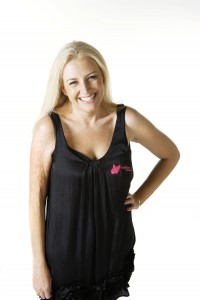 Danni Miller Today's guest post is written by Dannielle Miller. Dannielle is a highly respected and experienced educator, author and media commentator on issues affecting teenage girls. She is CEO of Enlighten Education, an organisation that works with thousands of teenage girls across Australia and New Zealand each year. Dannielle writes a thought-provoking weekly blog, and hosts a Facebook page, where an active community of students, parents and teachers and provide an important forum for discussing issues relating to girls and education. Dannielle is also the author of The Butterfly Effect, a book on raising happy, confident teenage girls by forging deeply connected and loving mother-daughter relationships. I lament the use of terms such as “liberation” and “empowerment” to sell women more and more product. In this post I want to particularly question the use of terms implying female empowerment in the growing trend to convince women to change what is surely something quintessentially female — our vaginas. Case in point? The latest series of advertisements for Schick Quattro’s TrimStyle all-in-one razor and bikini trimmer. The ads invite you to “celebrate your inner confidence” and, using the language of liberation, “free your skin”. According to the company’s PR blurb, five everyday Australian women were photographed and filmed for the campaign wearing nothing but lingerie, in and around some very public locations in Sydney’s CBD. Men are shown gawking at them, whilst other women look on admiringly. The women do have inspiring stories — there is a single mother and a cancer survivor — yet surely as the advertisement is for a bikini razor and they are seen posed in lingerie, we can only assume that their confidence actually comes from having well-groomed vaginas. Speaking of well-groomed vaginas reminds me of one of the most flabbergasting moments in talk-show history. In January last year Jennifer Love Hewitt famously discussed on American TV that she had devoted an entire chapter of her new book on relationships to decorating her hairless vagina with jewelled decals — a practice known as “vajazzling” that is gaining in popularity here, too. Hewitt told her host “Women should vajazzle their vajayjays . . . It really helped me.” She went on to say, “After a breakup, a friend of mine Swarovski-crystalled my precious lady . . . and it shined like a disco ball.” It really “empowered” her, she insisted (although apparently she was not quite empowered enough to use adult terms for her anatomy). Forget the war on terrorism — if the amount of ads for decorating, shaving, waxing and electrolysis are anything to go by, it is the age of the war on women’s vaginas. Actually, it is not just grown women who are being told they should doubt their own genitals. During the formal season last year, beauticians noted a huge increase in the number of young women wanting “intimate” grooming treatments. Girls as young as 14 were asking for Brazilian waxes. Enlighten Education’s Program Manager for New Zealand, Rachel Hansen, who is also a women’s health and sexuality educator, tells me of a school in NZ for Year 1 to 13 students that ran a beauty salon’s ad for Brazilian waxing in the school diary. Imagine pulling out your five-year-old daughter’s homework diary and an ad for Brazilian waxing jumping out at you. It seems teens no longer even know what “normal” is. In episode one of the UK’s 2009 Sex Education Show, when teens of both sexes were shown images of women with pubic hair, they gasped in what seemed to be shock or disgust. The producers had set out to show that in reality “we all come in all different shapes and sizes. From penises to pubes, bums to boobs whatever you’ve got it’s all perfectly normal.” Cosmetic surgeons would have us believe otherwise. As if waxing, plucking, electrolysis and decorating is not enough, far more serious procedures are being widely promoted by surgeons as important for restoring women’s “confidence”. Researcher Karen Roberts McNamara argues that women are going under the scalpel to have their vaginal openings tightened and their labias made smaller because they have been convinced this will “normalise” them and thus give them confidence: The sanitized ideal of the clean, delicate, discreet vaginal slit, so widely used in the plastic surgery industry discourse, functions in such a way as to cast the bodies who have not undergone these procedures as necessarily dirty and unsightly . . . Scholars have noted that in years past, women rarely had the opportunity to see other women’s vaginas and thus had no sense of how a typical vagina might look. Yet with the mainstreaming of the adult entertainment industry, the situation has changed dramatically. Now, a beauty standard has emerged, one established primarily through porn actresses, nude models and strippers . . . The irony of this situation is that in pornographic films and photographs, everything from eye colour or stretch marks, to genitalia, can be modified digitally. Amanda Hess, in her excellent piece “The Problem With Defending The Sacred Choice To Vajazzle”, concludes with a call-to-arms of sorts that I am taking up, and that I urge all girls and women to take up. For now, the more extreme performances of femininity, like breast implantation, vaginal ‘rejuvenation,’ and Vajazzling aren’t considered the norm for women. I’m not going to be met with shock when I remove my pants and reveal to my sex partner that I haven’t converted my pubic mound into a shiny disco ball. But these days, it wouldn’t be out of the ordinary for him to be shocked that I’m not perfectly waxed. The body hair ship may have sailed, but vaginal modification is at a point right now where we are still in a position to fend off the tide. And my greatest fear is that someday, we will wake to find that our girls are being routinely Vajazzled upon puberty, and realize that we never stood up to say, ‘This…is . . . ridiculous.’ I have had a number of conversations with parents this week on the expectations society puts on children and teens. I often blame the influence of raunchy music videos, inappropriate toys and the dreadful role modelling by Hollywood starlets. These conversations made me think about this photo I took a few months ago in the 'children's' section of a local bookstore:
Another mid-30s friend reminisced about reading various Judy Blume titles as a 12-year old. Notably 'Are You There God, It's Me, Margaret', and 'Forever'. and questioned whether these novels were in a similar vein. The former followed a girl's anxious progression through puberty, including her pleas to God to give her some breasts. The latter was a tale about first love - and the couple's foray into physical intimacy and eventially, sex. Prior to this happening, the couple is in a committed loving relationship, they discuss their feelings thoroughly and visit a family planning clinic for contraception. The language used in the book titles in the photo - 'sex god' and 'full frontal snogging' just don't seen quite as respectful and loving?! I have not read the books in the photo - they may well be excellent literature. I just don't think they should be in the children's section of a bookstore.  I am saddened by the way menstruation is usually referred to in negative ways. Girls usually laugh uncomfotably when I suggest to them that actually their menstrual period is AMAZING and a cause for celebration. And, encouragingly, more often than not they are open to learning to see it in a positive way. In my workshops with adults, women are often keen to share their experiences of their period. I am really interested in DeAnna L'Am's idea of menstruation being a 'chain of pain' that is passed from generation to generation. Today's post is written by DeAnna L’am. DeAnna is a speaker, coach, trainer and author of 'Becoming Peers – Mentoring Girls Into Womanhood'. Her pioneering work has been transforming women’s & girls' lives around the world, for over 20 years. DeAnna specializes in enriching women's lives at any age, helps mothers develop ease & confidence about their girl's puberty, and trains women to hold RED TENTS in their communities. Do you truly believe nature intended women to suffer monthly? This is a rather absurd idea, when you think of it this way, since menstruation is an essential component of women's ability to birth life. Without it, women will not be able to conceive. So how did this happen? How did a natural process become such a problem? Let's look at how menstruation is held by the culture at large. In western cultures women seem to be doomed when they do, and doomed when they don't (bleed, that is). Women are considered to be out of control when they are “on the rag,” and out of control when they are in menopause. Imagine how out of control one might get when their body is tired, their mind fatigued, their emotions exhausted... when every ounce of their being wants to go to sleep, yet they are not allowed to do so.... not only are they denied sleep, they are expected to go to work, be productive, cordial, efficient, and social.... wouldn't you go berserk? Well, women often do, if we buy into the cultural expectation of having “every day of the month be the same”, and push ourselves to prevent menstruation from interfering with our work and life. On top of this, we are also fed a diet of negativity about our menstrual cycle, from a very young age. A cultural taboo, often not mentioned by name, menstruation is referred to as a “necessary evil,” a nuisance, or “the curse”. Now imagine again how you would feel if you were so tired that all you could think of is sleep, yet you were told that your state is “a curse” and you must get over it and get on with your work. Or if you were offered medication to overcome your tiredness, and expected to perform at top notch? Wouldn't you snap? Indeed, this is what happens to many women all over the world, in response to years of internalized negativity about menstruation. This is coupled with the unacknowledged, ignored (and often unconscious) deep yearning to go inward, rest, replenish, and renew, during menstruation. Add cultural hostility to our denied monthly need to regenerate, and what do you get? Out-of-control-raving-mad-lunatic-raging-bitch! And rightly so! Since this is the ONLY way we can express the tension inside us. Or, perhaps, the only culturally acceptable way - to which society reacts by perpetuating the belief in menstrual “badness.” Not being taught to honour our monthly need for regenerating our emotions, and renewing our spirit (while our body renews itself) we not only loath our menstruation, but start developing symptoms, which will make us slow down, stay in bed, rest... This whole chain reaction could have been prevented in the first place, had we slowed down and took time out, monthly, without our body having to scream at us via painful symptoms. This “chain of pain” is passed on collectively by our culture, and individually -- from mother to daughter. Your grandmother was probably handed negative messages from your great-grandmother, your mother from your grandmother, you from your mother, and now, is your daughter receiving this painful legacy from you? How about your granddaughter, stepdaughter, niece, or your best friend's daughter? Do these girls hear you talk about menstruation as something you dread, hate, or can do without? Do they experience the wrath of your mood swings, irritability, or depression when you are menstruating, because you don't take time for yourself? What message do you think this conveys to them? And if you could convey another message, wouldn't you? Yes, you may say, but I can't convey another message since I'm suffering from PMS symptoms... Here is where I'd like to rock your boat a little (or a lot) by saying: PMS is Not a Requirement! PMS is your (wise!) body's strategy for getting your attention! It is your body's way of telling you that you need to slow down, go inward, release any toxins from the month you've lived, and regenerate yourself for the month ahead. Taking medication for PMS is like taking pills to suppress yawning when you are tired, while all you need to do is go to sleep. When you start questioning the beliefs you internalized about menstruation, when you start caring for your body and allowing it to naturally renew (rather than suppressing its need to rest) you are going to be able to gradually reclaim your cycle as a source of renewal in your life. Not only would you reverse your symptoms, but you could stop the legacy, which our culture has been blindly passing down from one generation to another. Furthermore, you'd be able to model an empowered womanhood to the next generation, starting with your own daughter. She and her peers will, in turn, be able to pass it on to those yet to be born. PMS can stop with you! And together, we can change the world... Thanks to DeAnna L’am for this thought-provoking post. 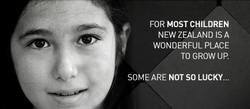 Image from www.childmatters.org.nz This morning my 2 year old son:
Lead story: "A 24-year-old man has appeared in court on a charge of assault after the body of a five-year-old girl was found in her Napier home early this morning." Another story: "Child advocacy organisations are calling on those that turned a blind eye to the systematic abuse of a nine-year-old Waitakere girl to be held accountable." More statistics to add to New Zealand's appalling child abuse record. After a morning delighting in the happiness of my toddler, this shocked me back to reality. Far too many kiwi kids are not spending their Christmas holidays filled with care and love. Too many children have days full of fear and pain. I am sick of reading about the deaths of innocent children, and subsequently of the individuals that turned a blind eye to the abuse. A number of people have already admitted that they knew about the horrifying situation the 9 year old girl in Waitakere had been enduring for two years. I am sure that right now there will be many people wrestling with the guilt of not saying anything that could have saved the life of the 5 year old girl in Napier. I wish that every child in our community could enjoy a Christmas free of violence and anger. But domestic violence surges over the festive season. So I know I will read about more violence and possibly more deaths before this festive season is over. We all need to take responsibility for this epidemic. People are working hard, very hard to address the problem. Child Matters is one such organisation. Visit this website, read the material, support their work. And in the midst of your Christmas celebrating, do think about the many kids in our communities for whom Christmas means a very different thing than the Disney fairytale. Maybe we all need to consider what we each can do to help in the fight against this epidemic when we are pondering our 2011 resolutions. It’s been a fascinating few days since I was alerted to the breasts marketing campaign and wrote my original blog post. This was picked up by the media and I appeared on current affairs show Close Up on Friday evening, debating NZgirl’s founder Jenene Freer.
As my first TV experience, I would say it was definitely trial by fire! It was certainly set up as a heated debate, rather than an ‘interview’ per se, and the fact that it was live to air made it a pretty intense experience. People have vehemently criticised both of us for interrupting each other, but I feel the producers had intended it to be this way so have stuck up for Jenene here. Jenene and I shook hands afterwards and she was very gracious. She said to me afterwards that on many things we were probably on the same page. I agreed with her, and certainly regarding breast cancer, we both would love for no woman to suffer this dreadful disease. What we disagree on is the level of harm caused that is an acceptable level in order to raise ‘awareness’ or money. Who has this campaign harmed? • The women and their families who uploaded naked breast photos that now feature on countless explicit porn sites. These women have no control over this image, or what has happened to it. • The many women and girls for whom a happy, healthy body image and strong self esteem is a challenge. The site clearly shows whose breasts are the most popular, and these are the breasts that conform to that narrow version of beauty pedalled by the media. • The many breast cancer survivors for whom “a lovely pair” campaign is just a blatant reminder of what they have not got. I have been overwhelmed by the poignant messages from many of these women. Kate has written a very touching post on this. I know that many people support NZgirl's campaign, and I know that many women have felt empowered and positive about it. That is good for them and I am not speaking for those women. I am speaking out for the many people who have been humiliated, exploited, degraded and offended by this campaign. Jenene Freer is a smart woman, she has achieved huge things in the business world and I really respect her for what she has achieved. Among other things, she is a director of an internet advertising company – she knows how to get websites making money. And no one can deny this marketing campaign has been a resounding success. Freer will be well aware of the HUGE impact this will have had on her advertising revenue – it will more than cover their maximum $5000 donation. And going forward, she can use these viewing stats to further convince advertisers to join them. Freer yesterday stated that "And just in case anyone wonders, and to clear up the "marketing ploy", I will never enter this into any marketing awards." So, companies only run marketing campaigns to win awards? Funny that, I understood that marketing campaigns were about increasing revenue. NZgirl are making way too much money out of this campaign, I can see that it would be financial madness for them to take it down. So I am not holding out hope for that. But I am relieved that they have responded to some of the criticisms and added a lot more information to their site with regards to breast cancer awareness, moderating images and about the implications of sharing information on the internet. It’s still too little, too late. It’s been quite a journey over the past few days and tomorrow morning I need to get back focussed on my work projects and my family. For those of you that sent abusive whacko messages, you have provided great entertainment. For those of you that have argued fairly against me, I respect you for making a stand for what you believe in. And for all you wonderful fantabulous people from all round the world who sent me countless messages of support and encouragement, you rock my world. The passion and outrage has been so powerful and I am proud to have been a part of the voice. Onwards and upwards! ** 8 Dec Update: NZGirl have been forced to clarify one of the un-truths stated in the Close Up interview. They put this on their Facebook wall yesterday: "The New Zealand Breast Cancer Foundation have requested we clarify any reader confusion and state that the ‘lovely pair’ campaign is in no way supported or endorsed by The New Zealand Breast Cancer Foundation." Close Up followed up with this article. Freer has continued to deny it, as evidenced in her comment below. I provided the exact transcript and find it sad that she wants to continue the lie. There was widespread discussion about the ''I like..." Facebook craze last month. While I felt that this campaign sexualised breast cancer in a weird kinda way, NZ Girl's latest campaign has left me (nearly) speechless. Viewers are invited to "get your tits out for the girls!... and don't forget to check out the other lovely pairs, beautiful boobs and pretty titties already uploaded."
For every 50 pairs of "titties" uploaded by viewers, NZGirl will donate $1000 to breast cancer awareness. This campaign began yesterday and already there is a gallery of over 49 pairs of breasts to peruse, rank and comment on. Hmm, a gallery of "titties" ranked according to popularity and the ability for me to leave comments about them. How exactly is this different to a crude pornography site? NZGirl is exploiting women and girls in order to drive traffic to their website. It is making light of an horrific disease in order to gain popularity. It is belittling the experience of breast cancer sufferers, many of whom are left scarred or who have had to have their breasts removed. But in marketing terms, this campaign has been a resounding success - over 25,000 people visited the site this morning, crashing it. Boganette has written a great post on why NZGirl's campaign is oh-so-wrong: "Celebrate breasts, of course. But don't do it in the name of breast cancer. Breast cancer isn't about breasts. It's not something you should have a laugh about on Twitter. It's not something you should joke about on Facebook. It shouldn't be a reason for posting photos of your breasts or flashing them or 'getting them out'... Breast cancer is a horrible, miserable, horrifying disease - that's it. It's cancer - it's not motivation for you to be happy with your body." I hate the pretty-fying of breast cancer. The sexy-fying of breast cancer. Breast cancer is not sexy images of pert wee breasts. If you want to see the realities of breast cancer, check out The Scar Project. It's raw and it's real. There is nothing funny about it. According to Stuff: NZgirl editor and general manager Tee Twyford said the campaign wasn't about driving traffic to their site, but about raising awareness. "The reason for it was twofold. There was a desire to have readers feel really good about their breasts and we wanted to align it with a breast cancer cause to get greater awareness and funding," Twyford said. So, according to Tee Twyford, women need to share photos of their breasts with the world in order to feel good about themselves. We all need to seek external validation to make sure that our breasts are up to scratch, that they're OK. Dear Tee, please explain how being in the lower half of the rankings is going to help 50% of those women feel good about their breasts? Because Tee, in a rankings system, there is always a loser. And for the 'winners' in the top half of the rankings, are they supposed to feel great about themselves because a whole bunch of strangers have critiqued their breasts and given them a thumbs-up? Tee Twyford, I am not going to send your website a photo of my breasts. They are beautiful and I love them. But I don't need NZGirl to rank them and I don't need strangers to give me their comments about them. Because those strangers don't know that my breasts and I have been through lots together. Those strangers don't know or care that my breasts fed my baby and that I love them in all their uneven, stretch-marky, increasingly-less-pert glory. Or that it took me quite some time to learn to love them. Disturbingly, but not surprisingly, many of the breast photos that have been uploaded seem to be of teenagers. Through Enlighten Education I work with teen girls throughout New Zealand. I often have tears of sadness when talking with them about the immense pressures they face with regards to their body. New Zealand's rates of eating disorders and depression amongst teenagers are skyrocketing. Just yesterday I spent a morning with 150 gorgeous year 10 girls who all told me that they felt that they were not beautiful enough, not skinny enough and not perfect enough. It is campaigns such this one that add to the overwhelming pressure and sense for girls that they are just not enough. As soon as I have posted this I am going to email Tee Twyford to invite her to sit in on one of these sessions. Perhaps then she would realise the effects that such media campaigns have on our girls. Once photos are uploaded on to the internet, the owners cease to have any control over how they are used. To assume that these photos will not be used for pornographic purposes is naive. We teach girls to never upload compromising photos of themselves - why is a (previously) respected website encouraging them to do exactly this? Women, why are we doing this to each other? Are men rushing to upload photos of their penis to raise money for "cancer awareness"? NZGirl, if your motivation really is to raise money for breast cancer research I can think of a million more positive ways to do this. Even simpler: if you really want to donate to a good cause, just get out your credit card and donate. Simple. I love these words from Steve Jobs, co-founder of Apple:
"Your time is limited, don’t waste it living someone else’s life. Don’t be trapped by dogma, living with the results of other people’s thinking. Don’t let the noise of others’ opinions drown out your own inner voice. And most importantly, have the courage to follow your heart and intuition. They somehow already know what you truly want to become. Everything else is secondary." And it is with those words I head into the weekend, head held high and skipping. This video gives such a powerful message in such a simple way. Reading the Sunday newspaper over a coffee is an indulgence I absolutely love. Not being an avid sports fan, I usually give the sports section a miss. But last Sunday I picked up the Sunday Star Times sports section, because one of the issues I discuss with girls through my work with Enlighten Education is how the media portray women in sport. I had read research on the media’s treatment of women’s sport but I was optimistic that surely the situation couldn’t be quite that bad. So I opened the 16-page sports section and started flicking through. Men’s rugby, men’s soccer, men’s rugby, men racing cars, men’s rugby, boys’ soccer, men’s rugby. “Where are the women?! ” I spluttered loudly, spilling my coffee in indignation. Finally – page 14, women got a full-page devoted to them. Yes, a full page feature article on the US Open Women’s Tennis. But don’t start celebrating - the headline? And beneath the atrocious headline? Photos of five of the top women in the US Open, followed by a one-word description - go on; I invite you read this out loud using your best Grammy awards nominee voice:
I soon realised that Ivanovic was not awarded the Contestant title for her tennis prowess – oh no: “Who’s the prettiest?” she says, buttering a roll, her slim wrist holding up a Rolex watch the size of a child’s fist. “Who’s the most popular, the most fashionable, who’s getting the most coverage?” She smiles sorrowfully to acknowledge that, when it comes to these contests, she tends to do quite well.” Ivanovic wins the ‘Contestant’ award because she is winning the beauty and popularity contests. The Bitchiness award seems to have stemmed from Elena Baltacha's comment: “I wouldn’t go out of my way to start a fight, but if I feel someone has done or said something on purpose, then I will react. I wouldn’t just take it, I would defend myself.” One comment seems justification enough to generalise a whole derogatory personality trait. After being described as a “truculent teen”, Jelena Jankovic is awarded the ‘Entertainer’ trophy after stating: “We are entertainers, as well, on court, in our own sporty way... We entertain the fans, they pay money to watch us play. It’s nice to see girls who are feminine, who dress nice. Maybe in the past there were only a couple of players like that, but now players pay more attention to it. I was one of those painting my nails different colours and matching them to my dress. If you are in a nice dress you can play better, feel better. More comfortable and confident”. This statement sounds as though it comes straight off a Sporty Bratz doll packaging. Nicest: Despite being the number one seed for this event, Caroline Wozniacki gets only the briefest of mentions: “Denmark’s Caroline Wozniacki... is one of the nicest in the top 10”. Because really, what interest would there be in a ‘nice’ tennis player when there are beauties and bitches to discuss? None whatsoever it seems. Soviet Tank: And Russian Svetlana Kuznetsova obviously doesn’t live up to the sexiness-factor necessary for women to play in the US Open, taking out the ‘Soviet Tank’ award. To further my dismay, this derogatory and juvenile article was written by a woman. Numerous quotes are scattered throughout this Sunday Star Times article that portray the women as simpering bimbo fashionista bitches. Strangely enough, despite not once mentioning anything about any talent any of the tennis players have, the journalist at times seems to be trying to take a feminist perspective regarding the discrimination that abounds in the women’s tennis circuit. Although she clarifies that the issue is definitely “not the most pressing in feminism today.” In her poem ‘Sisterhood’, Kate Wilson makes the point that it is often women who are propagating the sexualisation and objectification of women. The journalist’s claim that most of the world’s top female tennis players consider their on-court fashion their primary source of "empowerment" is a ridiculous statement. What research is she basing this on? Whether it’s “brilliant exploitation of a sexist media” or “a complete sellout” this journalist is part of it. 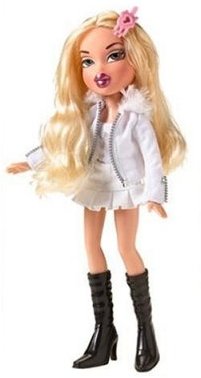 'Cloe' The article portrays the world’s top tennis players as if they were Bratz dolls, characters in an imaginary world of bling and beauty, the tennis a mere hobby on the side. In fact, I checked in on the Bratz website this morning, and realised that The Sunday Star Times article was just a grown-up version of Bratz Chatz. Let me share with you this morning’s inspiring Bratz Chatz: (Note to the uninitiated: Bratz dolls are marketed at girls age 2 – 11. There are five scantily clad, heavily made-up Bratz dolls, each with their own ‘personality’ and “passion for fashion”. This is the chat that occurred between the doll characters this morning) Sasha: Dancing is sooo much easier for me than sports. I love watching Cloe play [tennis] but it is so hard for me in gym. I have to sing to get through it! Jade: Yeah, I would much rather watch sports than play them but I get plenty of exercise walking around the mall every weekend, lol! Yasmin: Cloe convinced me to play tennis with her and I totally fell in front of Cloe’s very cute coach. I don’t know how she focuses on the game! Cloe: See? Good things come to those who work out! Btw, Yas was much better at tennis than she lets on. She’s got a mega strong serve. Sasha: Enough about the game! Who’s this new coach?? I think it’s time to set up a group hang for Cloe’s next match so we can scope out the guy! Cloe: Everybody chill! My tennis coach is awesome, he’s on the team at school, and we are JUST FRIENDS!! But I wouldn’t mind a cute outfit to wear, tee hee. Jade: Totally! And I’ll make her a new outfit because the last time I watched her play she was in ratty old sweats. So NOT cute! Yasmin: Ooh, I smell a makeover in the air! Not that our pal needs a makeover, since she’s cute enough on her own. Just a cool new look. So our young girls play make believe with sexy fashionista bimbos, and the media continues the conversation for our real life tennis heroes. Thank you Sunday Star Times, you made my search for discriminatory reporting of sport far too easy and time-efficient. I am horrified that it is 2010 and demeaning and offensive drivel like this is the only mention of sportswomen in New Zealand’s biggest newspaper of the week. I am heartened only by the fact that it was not a New Zealand journalist. Yet why the need to import this from the UK? I hope you will join me in emailing your dismay to the Sunday Star Times editor - david.kemeys@star-times.co.nz. (Note: I was unable to access a free version of this article that was written online, but it appears to be an edited version of an article that appeared in the Guardian UK on 19/06/10.) And while you are here check out this fantastic poem that covers a number of points raised in this post, and gives a call to action to all women:  This article featured as a guest post on Enlighten Education's blog a few weeks ago. The article deconstructs the media’s portrayal of violence committed by girls and asks us to focus on the real issue: that girls and young women urgently need our support. Periodically the media will seize upon an isolated incident or two and make sweeping generalised statements. In recent months, we have seen a lot of the tried and tested “girls gone bad” story, focusing on girls’ violence and bullying via internet and text messaging. No one will deny that the “girls gone bad” headline is a great attention-grabber. Girls engaging in violence challenge society’s fundamental beliefs about females as nurturers, protectors and as victims of violence. Yet in emphasising cases of girls’ violence more than boys’ violence, the media perpetuates the notion of the “bad girl” epidemic. This in turn legitimises violence as an option — “Other girls are doing it, why can’t I?” Social anthropologist Dr Donna Swift believes that: "the media . . . is creating the image of a new feminine epidemic of mean girls. Similarly, kickass girls, as I call them, are being promoted by the entertainment industry as the new role model for girls. This is a role model that promotes sexualised aggressive behaviour and rarely is our society countering this by teaching girls that assertive behaviour is an alternative option. Sadly, many young males find girl fighting titillating and some girls turn to this behaviour as a way of attracting male attention." Professor Kerry Carrington, from Queensland University of Technology’s School of Justice, said a simple internet search yielded 73 million hits for girls’ fighting, compared with 31 million for boys. There were 24 million girl-fight videos on YouTube – eight times more than those featuring boys. I propose that girls aren’t engaging in more fights than boys but that because female fighting breaks traditional norms, society is fascinated by it and gives it much more attention than male violence. An example of this fascination is the beer advertisement from the USA in which two women with plunging necklines have a minor disagreement. They begin to wrestle and as they do so, they discard their clothes, revealing sexy bodies in skimpy lingerie. They end up writhing and moaning together in wet concrete. At the end, two men imply that such a fight scene is every man’s fantasy: “Who wouldn’t want to watch that?” Focusing on the real issues What the “girls gone bad” sensationalist headlines don’t mention are the triggers and history behind girls’ violent offending. Focusing on hyped-up incidents sells newspapers because it shocks readers. It also makes it easier to ignore the real problems young women are facing. Dr Donna Swift is leading a research project in New Zealand that looks at violent and anti-social behaviour by teenage girls. Initial findings from the project indicate that of girls engaging in violence towards others, approximately 70% were not attending school, 60% were self-harming, 50% had experienced text bullying, 50% had run away from home, 40% had witnessed domestic violence, 30% had been raped and 30% had taken a drug overdose. Such findings are backed up by numerous international studies. At what age does society stop blaming the situation or the parent, and start demonising the child? As other commentators have noted, we need to remember that the violent girls we demonise in the media today are the abused and neglected children we read about with such compassion yesterday. More often than not, the demonic “girl gone bad” is a child who is actually desperately in need of love and support. Sensationalist media stories that focus on the negative exaggerate the problem of girls’ violence in the public’s eye and in doing so create a monster out of the teenage girl. This further demonises young women and creates a disconnect between them and the community – a community full of people who could potentially act as friends, mentors and advocates for the very girls that they are demonising. Increasingly, girls are engaging in other types of violence that very rarely hit the headlines: "Many young women are growing up with the societal expectation that they can do anything and must do everything. According to females portrayed in the media, girls should be brave, independent, strong, smart, savvy, athletic, and able to kick ass as well as being beautiful and sexy, be wanting and waiting for a relationship with Mr Right, able to produce adorable children, keep a perfect house and be ready to climb the next step on her career ladder. Girls who can’t compete for this reality take out their anxieties about personal inferiority or anger of rejection on themselves." – Dr Donna Swift Tragically, for many girls, acts of violence towards themselves, such as cutting and bulimia, are an everyday reality. Focusing on the positive We need to look beneath sweeping media generalisations about girls and violence. We need to celebrate the fact that the vast majority of our girls will never choose to engage in violent acts. We need to understand that the girls who do usually have long histories of victimisation and need the full support of the community. We need to focus on giving our girls the tools and the confidence to face up to the challenges of teenage life today. We need our communities to be overflowing with support for our girls. Only then will we be able to start turning the tide against self-harm, depression, bullying and violence. 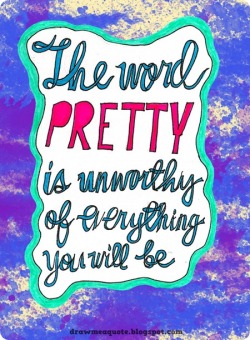 This is an extraordinarily powerful poetry performance by Katie Makkai defining the word "pretty", and the pressures faced by girls and women to define themselves by a narrow definition of "pretty". I love that it is calling for change and that it is raising awareness of the messages that mothers (and women in general) are passing on to their daughters. And the call to action at the end, a vow to her own 'someday- daughter' gave me goosebumps and tears. I invite you to watch the video below.  Dressed in a slinky red evening gown with long blonde hair, lengthy dark eye-lashes, sultry eyes and immaculate make up, Sasha Bennington looks every bit the glamour model ready to strut down the catwalk or pose for a fashion magazine cover. But Sasha is eleven; strip away the makeup and the sexy clothes, she is a little girl lost. Following on from Tuesday's 'Baby Beauty Queens' on 60 Minutes, last night 20/20 featured young Sasha and her family (from Manchester, UK). They were interviewed about Sasha’s “career” and their aspirations for her. It was a disturbing episode. With hundreds of dollars spent on her beauty regime every month, Sasha’s mother dreams of her daughter's future celebrity status – “I want Sasha to get every opportunity she can”. She seems to pay her daughter the ultimate compliment as she describes her looking “like one of those little Cindy dolls you play with”. After Sasha's mother described her daughter as confident and talented, when asked to describe herself, Sasha says “Three words to describe myself? – pretty, blonde, dumb... I am stupid”, followed by inane laughing of mother and daughter. Sasha later points out that “I don’t need a brain”. I acknowledge that such “current events” TV shows do often highlight the freaks and absurdities in our society, and I predict that the overwhelming majority of people who viewed this in NZ last night would share my views. Examples such as Sasha Bennington are the extreme: However, for many girls and young women growing up today, there is a similar pressure to achieve the looks and body of the models that surround us in magazines, TVs and billboards. It seems in many circles, the backlash against beauty contests, begun by the feminists in the 70s has well and truly turned full-circle. With our society obsessed with reality TV shows, offering the average punter their chance of “fame” and “making it”, is it any wonder that we are now seeing a resurgence in the popularity of beauty contests? For parents, they are the ideal training ground for such shows as Next Top Model, Idol etc. Sasha's take on it: “Like, 20 years ago, people cared about careers and stuff, but now it’s what you look like”. Such child beauty contests have not made it to NZ (that I am aware of), but a part of me thinks it is only a matter of time. I hope I am wrong. In the words of Kahlil Gibran, “beauty is not in the face; beauty is a light in the heart”. Child beauty pageants and all that surround them kill that light in the heart.  I was recently at a ‘style workshop’ and had been volunteered as one of the models to be 'made up' in front of an audience of business women – the goal was for me to be prepared (hair, makeup, clothes...) for a photographer to take some professional photos of me. I don’t consider myself very ‘stylish’ so it was a real treat! The presenter discussed having professional photos taken and the process of getting ready for them. She then added that with the wonders of photoshop, anything that wasn’t perfect could be fixed up. Until that moment, I hadn't ever considered photoshopping my own image. It was something that was done to celebrities and models. As I sat on the stage and looked at my image in the mirror, I suddenly saw the bags under the eyes, the crooked eyebrow... Hmmmm. The high-profile presenter was 50-ish, but joked that with the wonders of photoshop, she hadn’t really aged in the past 10 years and acknowledged that her publicity photos are a far cry from herself in ‘real life’. It got me thinking.
Do you have your image photoshopped? Why or why not? (PS: I have not ever had photos of me digitally altered. The main photo on my homepage is me complete with my smile-lines, forehead-creases and spots. But these are what make me, me. I have a red spot above my left eye which appeared in the first month of my pregnancy with my son (which resembles a pimple permanently threatening to break out... charming). It bugged me at first and I was assured it was hormonal and would disappear after the birth. Three years on, it has shown no sign of departing: but I like it. It is another mark on the journey of my life.)  We have mothers’ day, we have grandparents’ day, we have children’s day and we have teachers’ day. The proliferation of such days does get me a little cynical at times, but asides from the commercial aspect; they are all positive, loving days designed to honour a group in our community. This Friday we have ‘Hug-a-Ginga’ day, which seems to me to be to be a radio station’s big marketing stunt. Not being a commercial radio station listener, or a red-head, I hadn’t given much attention to this day in previous years. But this year the ‘Hug-a-Ginga’ concept has attracted a bigger debate, and this got me thinking. To me, ‘Hug-a-Anybody’ day gives the notion that this group is not used to being hugged, that on this one day of the year we should try and extend some charity and bless them with our sympathy. Transpose ‘ginga’ with any of the following: Pakeha, Maori, Fattie, Asian, Gay... you see my point. Is 'gingerism' the last acceptable prejudice? My adult red-headed friends take this day in good nature and play along and enjoy the comedy aspect and the extra attention. And I think this was probably how the day was intended to be ‘celebrated’. But my concern is for children. Red-headed kids cop more than their fair share of teasing as it is. Children ostracise those with differences and it is made worse when adults (indeed, media celebrities) are sanctioning and encouraging this bullying. This Friday, red-headed kids will have to play along with the ‘Hug-a-Ginga’ concept, or risk being further ostracised. I personally would feel violated if someone hugged me uninvited out of pity and charity. (And in schools, I can’t imagine many of these ‘Hug-a-Ginga’ acts will come from a position of love). With a bullying culture a real problem in most of our schools and a horrific youth suicide rate, is the promotion of prejudice based on genetics and the promotion of bullying based on hair colour really something to celebrate? |
AuthorRachel is a writer and educator whose fields of interest include sexuality education, gender, feminism and youth development. Archives
November 2023
Categories
All
|

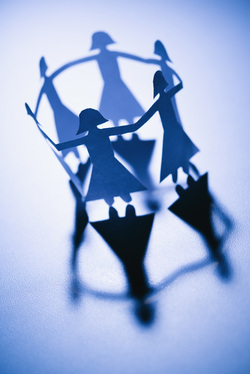
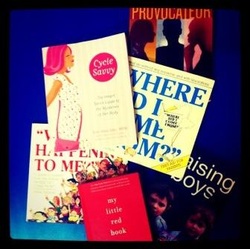

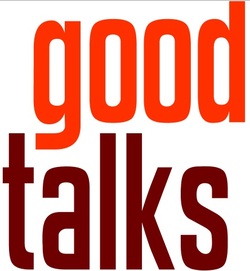


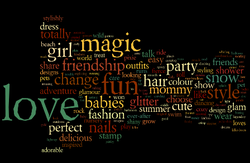
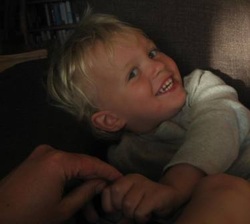

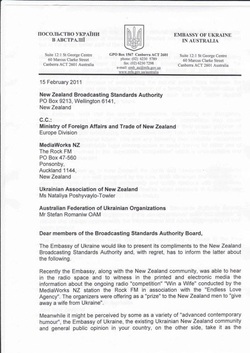
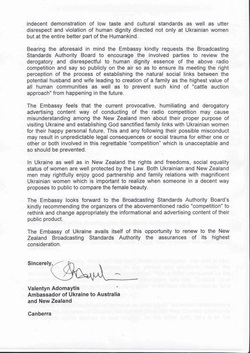
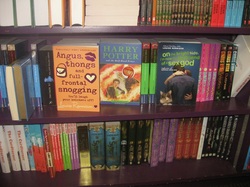
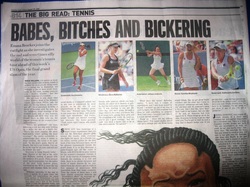
 RSS Feed
RSS Feed




